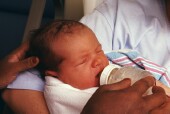
TUESDAY, April 1 (HealthDay News)– Giving a commonly used probiotic to babies who have colic doesn’t seem to help ease their discomfort at all, a new Australian study finds.
“Lactobacillus reuteri was not effective in reducing crying or fussing in infants with colic, whether they are breast- or formula-fed,” said lead researcher Dr. Valerie Sung, a pediatrician at the Royal Children’s Hospital, in Parkville, Victoria.
The finding is published online April 1 in the journal BMJ.
Colic is marked by periods of fussiness and crying or screaming, usually starting at about 2 weeks of age and disappearing by age 3 months or so. It has no long-term harmful effects, according to experts, but stressed-out parents look for relief.
Probiotics are live bacteria, used in supplements and food, to help people with digestive problems. The cause of colic is not known with certainty, but one possibility is digestive difficulties.
Sung’s team compared the probiotic to a placebo. They assigned 85 babies to the probiotic group and 82 to the placebo group for a month, noting the daily duration of crying or fussing in each group. Parents gave five drops orally of the probiotic or placebo once a day.
Parents also reported how long the infants slept and answered questions about the mothers’ mental health status and the babies’ quality of life.
“At one month, the probiotic group cried or fussed an average of 229 minutes per day, as opposed to 191 minutes per day in the placebo group,” Sung said.
After the researchers took into account other factors, such as age and the amount of crying at the study’s start, the probiotic group cried or fussed about 49 minutes more a day than the placebo group.
The increased fussing occurred only in the formula-fed babies. The probiotic did not affect crying or fussing time if babies were entirely breast-fed.
There was also no improvement in sleep, maternal mental health, family or infant functioning in the probiotic group, she found.
The new findings follow a previous evaluation by Sung’s team, published last October in the journal JAMA Pediatrics. In that study, the researchers reviewed 12 published studies and found conflicting results, with some finding the same probiotic effective for breast-fed but not formula-fed babies.
Nevena Krstic, a spokeswoman for the industry group International Probiotics Association, said her scientific team is still evaluating the study.
The new research was accompanied by a journal editorial by Dr. William Bennett Jr. The study is well done and conclusive, said Bennett, an assistant professor of pediatrics and a pediatric gastroenterologist at Indiana University.
Bennett often fields the question of what to do about colic from his patients’ parents. If their baby is bottle-fed, some have found switching to a hydrolyzed formula can help, he said. In those formulas, the protein is broken down so it’s easier to absorb.
Probiotics became popular among parents about five years ago, Bennett said, despite conflicting findings about their effectiveness. The new study, he said, “is by far the most well done and conclusive study on whether probiotics work in colic.”
Bennett said he reassures parents of babies with colic. “This is a normal phenomenon,” he tells them. “It’s very difficult, but it will get better.” While there are no long-term side effects, the short-term stress can be frustrating, he said.
Sung said parents should seek medical advice, being sure the pediatrician rules out any medical problems, and then get practical support. “Shop online for food, organize some babysitting,” she suggested.
Bennett also recommends that parents try the “five-S” remedy for colic: Sway the baby, swaddle him, make shushing sounds, lay the baby on his side, and let the baby suckle or give him a bottle.
More information
To learn more about colic, visit the American Academy of Pediatrics.
Copyright © 2026 HealthDay. All rights reserved.

